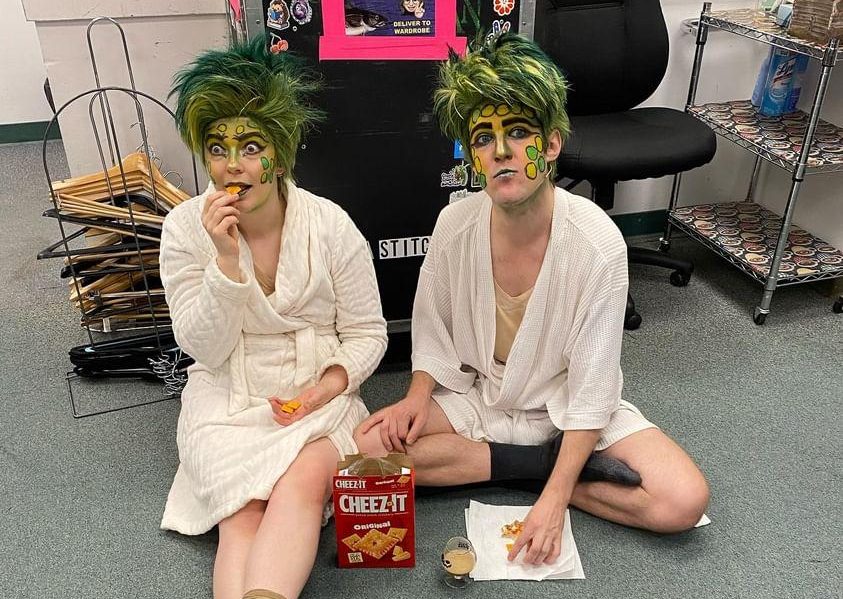Direct quotes edited for clarity.
On Friday, October 6, I watched Disney’s “The Little Mermaid” at the 5th Avenue Theater. At 7:32 p.m., it sprung to life in vivacious color, sound, and song. I was exuberant. I screamed when Ursula finished her most villainous number. I gasped when the jellyfish fluttered in “Under the Sea.” But most of all, I was curious. What did the actors in sea snail bodysuits do outside of rehearsal? How competitive were the auditions for Prince Eric? What is daily life like as a person in theater production? I talked with several professional actors to find out.
I asked Sam West, a California-based performer, what the 5th Avenue’s audition and rehearsal timeline would look like. The 5th Avenue is a regional theater, he explains; it’s “a step above any local theater.” The actors are paid more, and “it’s not touring, but people come from out of town for it.”
According to West, theaters have auditions for the main characters much earlier. They know the more professional actors are already booked for years of shows, so they might hold auditions up to a year in advance. “The more professional you are, the further out you’re booked,” he adds.
The theater holds ensemble auditions later. Once they finish the cast list, scripts and music are sent to the actors. They must memorize their lines by the time they start rehearsals. Rehearsal isn’t a set schedule; actors have to be ready when they’re needed. A more important role might work 20 hours a week, while the ensemble might only show up to a couple of rehearsals. “I did shows where I had, like, two rehearsals because I was only in the background for scenes,” West notes.
A lot more than singing happens in a show, including but not limited to backstage chaos, dressing room dance parties, and adorable cast bonding moments. Lakeside’s head of maintenance, Rob Burgess, exemplified this in his role as Grimsby in the 5th’s “The Little Mermaid” production. Right before a show, Burgess notes, “I bring two little Bluetooth speakers, and frequently, my dressing room is a dance party.” Everyone who walks by his room will do a little dance as they pass by.
At one point in the show, Ariel sings while taking a bubble bath in her new human form, with her maids freezing each time she points out a new sight. The first time she pointed and the maids froze, Mr. Burgess realized it was where he was waiting for his next entrance. “And so I used to do a little dance for her,” he laughs. “And then she told the other maids.” Pretty soon they would freeze with their faces turned toward him, so they could see what trick Burgess would do that time.
Mr. Burgess had a big role in “The Little Mermaid.” He would work at Lakeside from 6 to 9 a.m., then go to rehearsal until 7 p.m. “Those are big, long days, but they’re finite,” he reflects. Burgess has been working at Lakeside for almost 45 years, so Lakeside was able to be flexible with Mr. Burgess’s hours so that he could dedicate his time to the show.
Additionally, the forming of a “theater family” can make it hard to say goodbye to the show. “It is always a little difficult to say goodbye to a show,” Burgess says, adding that “it is particularly hard when you bond so well with people.”
It is not only the long hours and goodbyes that make musical theater a difficult industry. If you are not known for acting in your area, it’s hard to find audition offers. Sam West experienced this problem when he moved from California to Seattle. “I didn’t have any theater clout in Seattle. I didn’t know anyone,” he says. This was one of the reasons he stopped pursuing professional theater.
There are many stereotypes surrounding the expectations for upcoming actors. “Broadway is a monopoly on art,” West points out. “People think that if you don’t make it on Broadway, then, you know, you never lived up to your potential.” There’s a reason not to work in the biggest, most professional theater possible. Local or independent theaters, says West, “can never touch what professional theater does. But professional theater lacks the heart that independent theater has.”
West notes that the acting industry itself is a convoluted, ancient thing: “Pretty much 100% of professional theaters are run by horrible old men. And sometimes those horrible old men allow incredible creatives to make incredible art. But it is a very patriarchal system. It’s very old money. And for the most part, those people are bound to old patrons.”
Like any other industry, musical theater is one of rejection and capitalism, but it also holds a unique magic of storytelling, expression, and lasting friendships. All three of my interviewees had a sparkle in their eyes as they talked about their crazy experiences. This type of acting has a significant impact on one’s daily life, on and off the stage. Unlike a movie you can rewatch again and again, a show is finite. Each performance is a once-in-a-lifetime experience.


